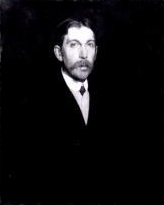Frank Rutter
| Frank Rutter | |
|---|---|

Frank Rutter, portrait by Gerald Kelly, 1910
|
|
| Born | 17 February 1876 Putney, London |
| Died | 18 April 1937 Golders Green, London |
| Nationality | English |
| Other names | Francis Vane Phipson Rutter |
| Occupation | Art critic, curator |
| Known for | Promoting Impressionism in Britain |
Francis Vane Phipson Rutter (17 February 1876 – 18 April 1937) was a British art critic, curator and activist.
In 1903, he became art critic for The Sunday Times, a position which he held for the rest of his life. He was an early champion in England of modern art, founding the French Impressionist Fund in 1905 to buy work for the national collection, and in 1908 starting the Allied Artists Association to show "progressive" art, as well as publishing its journal, Art News, the "First Art Newspaper in the United Kingdom". In 1910, he began to actively support women's suffrage, chairing meetings, and giving sanctuary to suffragettes released from prison under the Cat and Mouse Act—helping some to leave the country.
From 1912 to 1917, he was the curator of Leeds City Art Gallery. In 1917, he edited the cultural journal, Arts and Letters, with Herbert Read. In his writing after World War I, Rutter observed that advertising imagery was seen by far more people than work in art galleries; he noted a new realism after the period of "abstract experiment"; and he praised the work of Dod Procter as a "complete presentation of twentieth century vision".
Frank Rutter was born at 4 The Cedars, Putney, London, the youngest son of Emmeline Claridge Phipson and Henry Rutter (died 1896). His grandfather, John, and his father were both prosperous solicitors with chambers in Cliffords Inn, Holborn, and both had acted for John Ruskin, John assisting on Ruskin's marriage nullification with Euphemia (Effie) Gray; Henry severed the connection with Ruskin, after the latter rejected his counsel on a property transaction.
From 1889, Frank Rutter was educated at Merchant Taylors' School, at that time in Aldersgate, where he specialised in Hebrew (under the influence of his father whose hobby was Biblical archaeology) and where pupils were expected to gain Oxbridge scholarships or exhibitions in classics: Rutter, aged seventeen tried but failed to gain a scholarship in history at Exeter College, Oxford, but was successful in the Queens' College, Cambridge, examination for a scholarship in Hebrew, going to university in 1896 and gaining the Semitic Language Tripos (degree) in 1899.
...
Wikipedia
